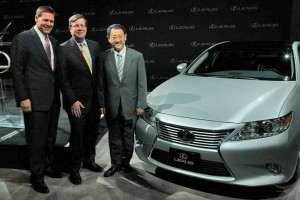Lopsided exchange rates and potential natural disasters are two reasons why Toyota officials said they plan to shift production of the Lexus ES from Japan to the U.S. during a news conference in New York earlier today – but TheDetroitBureau.com has learned of yet another reason. The Kyushu plant currently producing the Lexus sedan will need to make room for an all-new model the luxury maker is getting ready to bring to market.
While Jim Lentz, Toyota’s top North American executive declined to identify that new model, sources indicate it is likely to be a compact crossover filling a niche below the current RX line. Lentz did say Lexus expects it could yield more than the 50,000 units of annual demand the ES currently generates.
He also hinted, that this new model and other possibly offerings Lexus is looking at are part of the brand’s push to shift focus from the Baby Boomers who currently dominate its customer ranks to the next generation of luxury buyers. “We’re always looking at the luxury business which will change over time,” explained Lentz during a one-on-one conversation with TheDetroitBureau.com. “The consumption of luxury and what it means to Boomers may be very different for Gen-Y. We need to prepare ourselves for what younger luxury buyers will want.”
As a result, don’t be surprised to see Lexus – and its competitors – “scrap” some of its current line-up as they lose their market appeal. Precisely what will replace those products, Lentz isn’t ready to say, but if other luxury leaders are any indication, there’s likely to be a continuing shift to smaller and greener products, whether they use advanced gasoline and diesel technologies or hybrid, plug-in or pure battery electric powertrains.
And the conventional line between sedans, coupes and crossovers will continue to blur, suggested several industry analysts asked about the likely direction Lexus will take.
For some of Toyota’s competitors, the shifting sands of the luxury market have triggered a proliferation of product never seen before. Mercedes, which once debated the need for the “Baby Benz,” today’s C-Class, has downsized with the B- and A-Class lines and reportedly will follow with the new X-Class.
Asked if Lexus will go mano-a-mano, Lentz said that’s not the Japanese brand’s strategy.
“We have to rationalize our line-up. We can’t just add more and more and more,” he cautioned. “I don’t think we can be everything to everybody.”
While Lexus may be the third-largest luxury brand in the U.S. market, said Toyota’s new President of North America, it is still a fairly new brand in many key regions of the world where it got off to a relatively late start, including Europe and, ironically, in Japan. As a result, Lentz stressed, “We don’t have the sheer volume” to be able to match the competition, product for product.
With the tweaks now in motion, he added, the current line-up should continue to deliver good profits to parent Toyota.
The decision to move the Lexus ES to the U.S. will require a more than $500 million update at the maker’s Georgetown, Kentucky plant. But it’s part of a broader increase in production that should boost North American capacity from 1.8 million last year to 2 million by around 2015, Lentz told TheDetroitBureau.com.
For the moment, that appears to position the maker well, and should mean that about 75% of the vehicles sold in the region will be produced here.
That may surprise those expecting to see Toyota shift at least some production of the Prius hybrid to the U.S. But while that is not in the current plans, Lentz added he would quickly “raise my hand” if corporate planners decide to further increase Prius production.
Lentz’s promotion, several months back, marked a major milestone for a Toyota Motor Co. undergoing rapid change under the guidance of President Akio Toyoda – grandson of its founder. He is one of four non-Japanese now heading major divisions of the company, and the second American with Mark Templin overseeing Lexus worldwide. A third American, former General Motors rising executive Mark Hogan was also placed on the Toyota board, the company’s first outside director.

